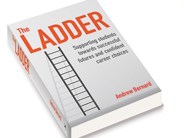In my book The Ladder, I have devoted an entire chapter to dispelling some of these myths and suggesting how to tackle them, I’ll share some of them with you now.
Myth 1. Where you’re from doesn’t affect your life chances.
What if you’re from one of the ‘cold-spots’ identified by the Careers and Enterprise Company[1]where multiple reasons have reduced employment options? What if you’re from an area with high unemployment since the closure of heavy industry? What if you’re from a family who decided, for example, that university ‘isn’t for the likes of us’? The Sutton Trust found that young people from less privileged backgrounds often lack the support and guidance to overcome the suggestion that university isn’t for them[2]so intelligent children will find it hard to convince themselves that university ‘is worth getting into debt for’ even if they are perfectly capable of it.
Writing in RIFE: 21 stories from Britain’s Youth, Ilyas Nagdee[3]makes an important observation about progression to university for young people from Black and Minority Ethnic (BAME) backgrounds: “the university on my doorstep was very different to the Manchester I grew up in…quite often in cities like Manchester, huge universities are close to areas with low progression into university, and the communities nearby benefit least from these gigantic institutions”. University outreach activity is important but it needs to focus on supporting specific communities around each institution. After visiting an open day at Manchester University ‘lured by the promise of food’ Nagdee enjoyed the experience, understood he belonged there and became determined to go to Birmingham University. Whilst there, he became a member of the University’s Black Ambassador Scheme, going on to become Black Students’ Officer for NUS[4]because, as Marian Wright Edelman says, ‘you cannot be what you cannot see’ and he wanted to support young people from BAME backgrounds.
Action: Look into your local universities and their NCOP programmes – see how your students can benefit from visits and sessions on student funding etc. Arrange visits for all students regardless of their grades – sometimes visiting a university will ignite more ambition and therefore effort.
Myth 2. Apprenticeships: a less-academic option for young people?
ABM UK found in their research in 2018[5]interviewing 2,000 parents and 2,000 11–15-year-olds, that 43% of parents felt apprenticeships were poorly paid and saw them as a second-rate option for young people who ‘failed their exams’. However, Apprenticeships do support skills and higher skills development and are focused on employability and are debt-free. Director General of the CBI, Carolyn Fairbairn said in 2019[6]“the need to best prepare our young people for work has never been more important. The growing need for higher level skill is already holding some firms back” so there’s clearly a need for businesses to invest in their skills base. With 319,000 starting in 2019/20 they are in demand – however the signs are that covid has reduced the first two quarters take up by 7.3% compared to 2018/9.
For all their focus on skills and lack of debt, there is one area that does seem to detract from the social-mobility message – higher apprenticeships will affect the family income through tax credit, universal credit and housing benefit in many instances[7]. Professional CEIAG advice is essential in deciding pathways.
Action: Consider local employers’ apprenticeship offerings, ask them to come in and speak to all students and ask your Careers team to make sure they’re up to date on how apprenticeships could affect a post-16 student’s family finances.
Myth 3. Stereotypes aren’t a problem these days.
The ‘Drawing The Future’ research by the Education & Employers charity[8]tasked 20,000 7-11 year olds with drawing a number of people in careers. The results observed that gender stereotyping was very much alive and well and is established by 7 years old.
Action: Tackling stereotypes needs to be done as a conscious choice – gender, race, age, disability – all of these areas need to be considered when broadening the horizons of the children we work with: it’s ongoing and vital.
The angle I’m coming from in The Ladder is that every teacher is, in some ways, a careers teacher – all teachers impact on supporting children in developing knowledge and awareness for confident futures – and the research, ideas and tools in the book make this task straightforward to do whatever you teach.
Are you going to join me and #SetUpTheLadder?

Bernie's best-selling bookThe Ladder is available now from the Independent Thinking Press website.[ITL]
References:
[1]Careers and Enterprise Company, Updating the Careers Cold Spots: The Careers and Enterprise Prioritisation Indicators(London: Careers and Enterprise Company, 2018),p. iv. Available at:https://www.careersandenterprise.co.uk/sites/default/files/uploaded/updating_the_careers_cold_spots_report.pdf.
[2]Quoted in Rebecca Attwood, ‘Not for the Likes of Us’, Times Higher Education(12 August 2009). Available at: https://timeshighereducation.com/news/not-for-the-likes-of-us/407750.article.
[3]Ilyas Nagdee, ‘Half-Truth Histories: How Erasing Empire Maintains the Status Quo’. In Nikesh Shukla and Sammy Jones (eds), RIFE: Twenty-One Stories from Britain’s Youth(London: Unbound, 2019), pp. 193–209 at p. 200.
[4]Nagdee was the National Union of Students (NUS) Black Students’ Officer from 2017–2019, representing, campaigning on behalf of, and advocating for BAME students.
[5]Chris Townsend, Do You Mind the Gap? This Week in FM(5 March 2019). Available at: https://www.twinfm.com/article/do-you-mind-the-gap.
[6]Royal Society, Royal Society Calls for Independent Review of Post-16 Education (12 February 2019). Available at: https://royalsociety.org/news/2019/02/call-for-independent-review-of-post-16-education/.
[7]https://www.gingerbread.org.uk/information/benefits-tax-credits-and-universal-credit/money-when-your-child-turns-16/
[8]Nick Chambers, Elnaz T. Kashefpakdel, Jordan Rehill and Christian Percy, Drawing the Future: Exploring the Career Aspirations of Primary School Children from Around the World (London: Education and Employers, 2018), p. iv. Available at: https://www.educationandemployers.org/wp-content/uploads/2018/01/Drawing-the-Future-FINAL-REPORT.pdf.
This blog first appeared on the Innovative Enterprise blog pages.


About the author
Andrew Bernard
Andrew 'Bernie' Bernard is a nationally-recognised expert on issues around career teaching and planning in primary and secondary schools. He is the author of the best-selling book The Ladder: Supporting students towards successful futures and confident career choices for the Independent Thinking Press